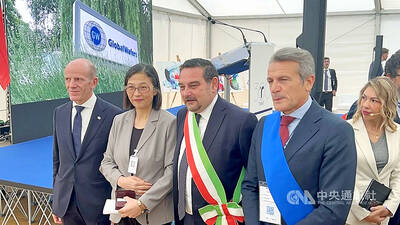Far EasTone Telecommunications Co (遠傳電信), the nation’s third-largest telecom, yesterday said it has earmarked NT$500 million (US$15.36 million) this year to invest in start-ups, such as digital content, to explore new growth opportunities.
Last year, the telecom invested NT$150 million on new start-ups via a venture capital fund managed by AppWorks (之初創投), founded by Jamie Lin (林之晨).
The fund invested in start-ups providing digital content, mobile payments and cloud-technology services for enterprises.
“It is possible that we will see more investments on start-ups this year in collaboration with venture capital funds. We are in talks with them to scout investment targets primarily in the digital content [sector],” Far EasTone president Yvonne Li (李彬) told reporters.
Li said that start-ups would be one of the company’s growth engines this year, apart from its core services.
Information and communication technology services for enterprise customers and digital contents would be two major growth areas, Li said.
To boost over-the-top (OTT) subscription, Far EasTone plans to spend as much as NT$20 million this year to acquire the rights to English-language movies, as well as Chinese, South Korean and Japanese soap operas, Li said.
The budget is 50 percent higher than last year, she added.
Far EasTone expects its OTT subscribers to increase to 500,000 this year, Li said.
The growth would mostly come from video-streaming subscriptions. The number of video-streaming subscribers is expected to grow 28 percent to 320,000 and to 500,000 within next three years, Li said.
Li said US online TV and movie streaming service provider Netflix would not pose a threat to Far EasTone’s expansion into the OTT market.
Netflix mainly targets English-language movie watchers, rather than the soap operas that Far EasTone is focusing on, she said.
Instead, Baidu’s (百度) app store and online video platform iQiyi (愛奇藝) is on Far EasTone’s radar, as they have similar target demographics, Li said.
Separately, Li said Far EasTone is set to commercially launch 4G services on its newly acquired 2600 megahertz spectrum next quarter.
The coverage of the spectrum would reach 50 percent at the end of the year, she said.
The telecom plans to spend NT$9.9 billion on new equipment, down from last year’s NT$11.8 billion.
Far EasTone aims to boost its 4G subscriber penetration rate to 65 percent this year from 45 percent last year.
Far EasTone shares fell 0.7 percent to close at NT$71.4 in Taipei trading yesterday.

RECYCLE: Taiwan would aid manufacturers in refining rare earths from discarded appliances, which would fit the nation’s circular economy goals, minister Kung said Taiwan would work with the US and Japan on a proposed cooperation initiative in response to Beijing’s newly announced rare earth export curbs, Minister of Economic Affairs Kung Ming-hsin (龔明鑫) said yesterday. China last week announced new restrictions requiring companies to obtain export licenses if their products contain more than 0.1 percent of Chinese-origin rare earths by value. US Secretary of the Treasury Scott Bessent on Wednesday responded by saying that Beijing was “unreliable” in its rare earths exports, adding that the US would “neither be commanded, nor controlled” by China, several media outlets reported. Japanese Minister of Finance Katsunobu Kato yesterday also

‘DRAMATIC AND POSITIVE’: AI growth would be better than it previously forecast and would stay robust even if the Chinese market became inaccessible for customers, it said Taiwan Semiconductor Manufacturing Co (TSMC, 台積電) yesterday raised its full-year revenue growth outlook after posting record profit for last quarter, despite growing market concern about an artificial intelligence (AI) bubble. The company said it expects revenue to expand about 35 percent year-on-year, driven mainly by faster-than-expected demand for leading-edge chips for AI applications. The world’s biggest contract chipmaker in July projected that revenue this year would expand about 30 percent in US dollar terms. The company also slightly hiked its capital expenditure for this year to US$40 billion to US$42 billion, compared with US$38 billion to US$42 billion it set previously. “AI demand actually

Jensen Huang (黃仁勳), founder and CEO of US-based artificial intelligence chip designer Nvidia Corp and Taiwan Semiconductor Manufacturing Co (TSMC, 台積電) on Friday celebrated the first Nvidia Blackwell wafer produced on US soil. Huang visited TSMC’s advanced wafer fab in the US state of Arizona and joined the Taiwanese chipmaker’s executives to witness the efforts to “build the infrastructure that powers the world’s AI factories, right here in America,” Nvidia said in a statement. At the event, Huang joined Y.L. Wang (王英郎), vice president of operations at TSMC, in signing their names on the Blackwell wafer to

Taiwan-based GlobalWafers Co., the world’s third largest silicon wafer supplier, on Wednesday opened a 12-inch silicon wafer plant in Novara, northern Italy - the country’s most advanced silicon wafer facility to date. The new plant, coded “Fab300,” was launched by GlobalWafers’ Italian subsidiary MEMC Electronics Materials S.p.A at a ceremony attended by Taiwan’s representative to Italy Vincent Tsai (蔡允中), MEMC President Marco Sciamanna and Novara Mayor Alessandro Canelli. GlobalWafers Chairwoman Doris Hsu (徐秀蘭) said the investment marked a milestone in the company’s expansion in Europe, adding that the Novara plant will be powered entirely by renewable energy - a reflection of its